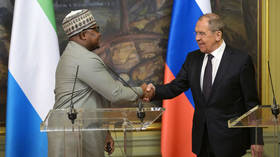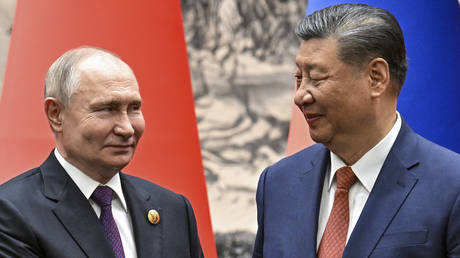Idlib offensive paused as Russia, Turkey agree on buffer zone
A military operation against Idlib is “off the table”, Russian Defence Minister Sergei Shoigu has confirmed, after Russia and Turkey agreed on the creation of de-militarised buffer zone around the northern province yesterday, averting international concerns of an imminent humanitarian catastrophe.
Presidents Vladimir Putin of Russia and Recep Tayyip Erdogan of Turkey revealed the deal at a press conference last night, after days of talks in the Black Sea resort of Sochi.
The agreement stipulates the creation of a 15-20 kilometre zone, to be established by 15 October, from which “radical fighters” will withdraw, Putin said, referring to former Al-Qaeda affiliate Hayaat Tahrir Al-Shaam (HTS) and other jihadist factions.
All heavy weaponry is also to be withdrawn from all opposition forces by 10 October – an approach supported by the government of Syrian President Bashar Al-Assad, but one that is expected to be met with resistance from rebel factions.
In his briefing, Erdogan stated that the buffer zone would be monitored by Turkish and Russian patrols
“We decided on the establishment of a region that is cleaned of weapons between the areas which are under the control of the opposition and the regime,” said Erdogan, whose administration backs certain opposition factions in Idlib.
“In return, we will ensure that radical groups, which we will designate together with Russia, won’t be active in the relevant area. We will prevent a humanitarian tragedy which could happen as a result of military action.”
He went on to reiterate that the greatest threat to Turkey was the Syrian Kurdish People’s Protection Units (YPG) who control swathes of territory in northeast Syria as part of the US-backed Syrian Democratic Forces (SDF).
Russia and the Syrian regime had been advancing on the north for the past several weeks, prompting fears of a looming largescale attack. Home to some three million people, half of whom are displaced from elsewhere in Syria, the UN, Turkey and other Western nations have repeatedly warned that any major assault on the northern province could lead to a bloodbath.
Ankara has established a dozen military observation posts around Idlib, which it reinforced with troops and equipment in recent weeks, in anticipation of an imminent assault. Since the beginning of the month, preliminary shelling and air strikes by the regime and Russia have killed at least 28 civilians in Idlib, according to the White Helmets civil rescue unit and at least 30,000 people have been displaced from southern towns near the border with neighbouring Hama.
News of the deal has been positively met in Idlib, with civilians taking to the streets in celebration of the ceasefire. Some rebel officials have also praised the move, expressing hope that a de facto control by the opposition of a “geographic area” would be a springboard for a political transition that ends Assad’s “authoritarian” rule.
The Idlib deal preserves lives of civilians and their direct targeting by the regime. It buries Assad’s dreams of imposing his full control over Syria
Mustafa Sejari, a Free Syria Army (FSA) official, told Reuters.
Yet the proposed deal has been met with scepticism from other opposition groups, who have questioned whether the regime and its allies will abide by the proposed ceasefire in the buffer zone. Areas previously designated de-escalation zones, including Eastern Ghouta and Daraa, were attacked by the regime earlier this year, resulting in the deaths of hundreds of civilians, despite international outrage.
Officials from HTS, which controls some 60 per cent of Idlib, have criticised the agreement and its call for opposition groups to disarm, deeming those who surrender their weapons “hypocrites”.
On the international stage, the deal is being hailed as a significant diplomatic achievement for Turkey, in averting a largescale assault for the time being, and asserting its influence over Russian and Syrian demands.
“More than anything, this gives Turkey more time (and more leverage) to manipulate conditions in Idlib and to further exacerbate HTS’ internal divisions and work towards separating acceptable or irreconcilable [factions],” Director of the Extremism and Counterterrorism Programme at the Middle East Institute, Charles Lister, said of the agreement.
Infighting amongst opposition factions has intensified in recent weeks in light of the formation of a new coalition known as the National Liberation Front (NLF), backed by Turkey. Made up of some 11 major factions, it excludes HTS, which has faced pressure from Turkey to dissolve and be absorbed into the alliance.
Related Articles:
Driving the extremists out of Syria’s Idlib province should be the primary goal at this stage of the Syrian peace process, Russian President Vladimir Putin said following a meeting with his Turkish and Iranian counterparts. The Russian leader once again said that Moscow has “irrefutable” evidence that terrorist groups entrenched in the militant-controlled province are seeking to stage false flag attacks using chemical weapons.

![Syria: 560 killed, 2,000 injured in Eastern Ghouta in 9 days - Cartoon [Sabaaneh/MiddleEastMonitor]](https://images.weserv.nl/?url=i2.wp.com/www.middleeastmonitor.com/wp-content/uploads/2018/04/28423515_10156241164901926_8928736657749293347_o-1.jpg?resize=933.5%2C678&quality=75&strip=all&ssl=1)


